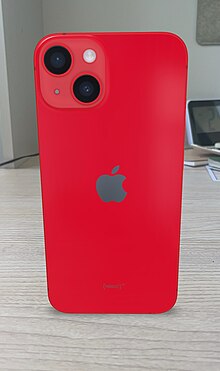 | |
 Product Red edition of the iPhone 14 | |
| Product type | Brand |
|---|---|
| Owner | Red (One Campaign) |
| Introduced | 20 January 2006 |
| Markets | Worldwide |
| Website | red |

Product Red[a] is a licensed brand by the company Red[b] that seeks to engage the private sector in raising awareness and funds to help eliminate HIV/AIDS in eight African countries, namely Eswatini, Ghana, Kenya, Lesotho, Rwanda, South Africa, Tanzania, and Zambia.[1] It is licensed to partner companies including Apple Inc., Nike, American Express (UK), The Coca-Cola Company, Starbucks, Converse, Electronic Arts, Primark, Head, Buckaroo, Penguin Classics (UK & International), Gap, Armani, FIAT, Hallmark (US), SAP, Beats Electronics, and Supercell.
The concept was founded in 2006 by U2 frontman and activist Bono, together with Bobby Shriver of the One Campaign and DATA. The Global Fund to Fight AIDS, Tuberculosis and Malaria is the recipient of Product Red's money.
As part of a new business model, each partner company creates a product with the Product Red logo.[2] In return for the opportunity to increase revenue through the Product Red license, up to 50%[clarification needed] of profits gained by each partner is donated to the Global Fund.[3][needs update] Such an amalgamation of humanitarian aid and for-profit businesses is one example of "ethical consumerism". In 2012, One Campaign acquired Red as a division of One.[4] Both organizations were co-founded by Bono and Shriver.[5]
Since 2020, Product Red has been used in the global fund to combat the COVID-19 pandemic.
Cite error: There are <ref group=lower-alpha> tags or {{efn}} templates on this page, but the references will not show without a {{reflist|group=lower-alpha}} template or {{notelist}} template (see the help page).
- ^ "HOW (RED) IS MAKING A REAL DIFFERENCE, The money is used to finance HIV/AIDS grants in Ghana, Kenya, Lesotho, Rwanda, South Africa, Swaziland, Tanzania, and Zambia". Retrieved March 21, 2017.
- ^ "RED Case Study". Wolff Olins. 2011. Archived from the original on January 12, 2012. Retrieved October 15, 2012.
- ^ [1] Archived July 5, 2011, at the Wayback Machine
- ^ "Michael Elliott". ONE. September 28, 2012. Archived from the original on November 20, 2016. Retrieved November 18, 2016.
- ^ "FAQs & Contact - (RED)". (RED). Archived from the original on June 25, 2020. Retrieved November 19, 2016.